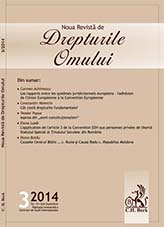Cauzele Centrul Biblic al Republicii Ciuvasia c. Rusia şi Cauza Radu c. Republica Moldova
Case Biblical Centre of the Chuvash Republic v. Russia and Case Radu v. the Republic of Moldova
Author(s): Diana BotăuSubject(s): Politics / Political Sciences
Published by: Centrul de Studii Internationale
Keywords: Bible Centre of the Republic of Chuvashia; Russian courts; private and family life; consent of the employee
Summary/Abstract: 1. The fact that Russian courts ordered the dissolution of the complainant’s organization, Bible Centre of the Republic of Chuvashia, the Russian courts have not followed the Constitutional Court's case law or the relevant standards of the Convention; In addition, their decision does not include an analysis of the impact of the complainant’s organization dissolution for fundamental rights Pentecostal believers. Therefore, their decisions put an end to an old religious organization and that is an extremely serious interference with the rights of the petitioner's fundamentals, interference cannot be regarded as proportionate to any legitimate aim pursued. For these reasons, the Court considered that the dissolution of the complainant’s organization was not necessary in a democratic society, so art. 9 of the Convention read in the light of art. 11 were violated. 2. Court found that the law on access to information does not allow a physician to disclose Personal Information, not even to the employer, without the prior consent of the employee. The respondent Government admitted that there was an interference with the right respect for privacy of petitioner. Moreover, all relevant regulations, national and international, which were claimed in case expressly prohibit the disclosure of such information on the private life, health, pregnancy, etc. to the point at which the gesture is even a crime. The Court found that there was a violation of art. 8 of the Convention, in relation to the petitioner's right to respect for his private life. Art. 8. Right to respect for private and family life. 1. Everyone has the right to be respected his private and family life, his home and his correspondence. 2. is not permitted interference by a public authority regarding exercise of this right except such as it is prescribed by law and constitute, in a democratic society, a necessary measure for national security, public safety, economic well-being of the country, prevention of disorder and prevention of crime, protection of health or morals, rights and freedoms of others.
Journal: Noua Revistă de Drepturile Omului
- Issue Year: 10/2014
- Issue No: 3
- Page Range: 93-105
- Page Count: 13
- Language: Romanian

